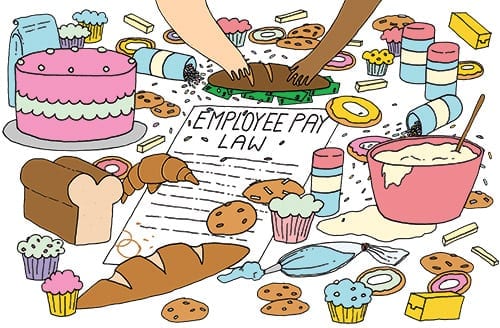
Sofia’s lifelong dream was to bake for a living. She had studied business, taken cooking classes and learned how to make wonderful pastries. She began her business by baking at home, selling her pastries to friends and family and catering their small events.
Over time, Sofia’s most popular product became a delicious, caffeinated breakfast bar. This caught the eye of a local food critic, who wrote about it. Demand spiked. When her community college placed a large, continuing order for its cafeteria, Sofia needed a production site.
Sofia had an older family friend, John Oldschool, who recently had lost his job. Although John had no experience in the food industry, he offered to help. He told Sofia, “I’ll volunteer for now — pay me when you can.” Sofia was thrilled, as she had absolutely no money for payroll.
Sofia found a small site to produce her breakfast bars. The wrappers were printed offsite and she bought a used packaging machine to wrap the bars. She felt lucky to have John making deliveries to the college cafeteria and helping her. John also sold the breakfast bars every workday morning from a small pushcart in the downtown business district.
After a couple of months, Sofia started paying John a weekly salary of $500. Although he felt underpaid — working five days per week, 10 hours per day — he was grateful to have some income finally. Formal payroll was a problem for Sofia, so she simply paid John the full amount of $500 in cash.
The division of labor was simple. Sofia made and baked the breakfast bars and ordered supplies. John delivered the bars to the cafeteria, sold them from the pushcart until 1 pm and then picked up the supplies on his way back to the production site. He spent the rest of the day operating the machine that wrapped the bars, keeping track of inventory and cleaning up at the end of the day.
Within a short time, Sofia got a call from a friend who worked for a chain of grocery stores. The friend had given Sofia’s breakfast bar to one of the store’s buyers, and the store wanted to place several large orders. Success! Sofia needed John’s job to change, focusing on managing this new account, the college cafeteria and Sofia’s new initiative for online sales. She would find someone else to work part-time to handle the downtown pushcart.
Sofia bought special software to control purchasing, production and shipment, and she needed John to learn to use it. This did not go well. John rarely used computers and did not even own a smartphone. He had liked his job and did not want to change.
Sofia tried to convince John to step up. At first he agreed to try, but he found it too complicated. He went back to Sofia and accused her of wanting to force him out of the business.
To help him, Sofia hired a consultant to train John to use the software. John skipped the first session. Sofia asked him not to miss again. When he skipped the next two sessions, Sofia gave him a verbal warning and then a written warning. She placed notes about these in John’s personnel file, but she did not tell him she had done this.
John was scheduled to have another training session with the consultant, but again, John didn’t show up. Sofia knew that she had to replace him. She intended to thank John, tell him that he could collect unemployment and give him a great reference letter. But, she never had a chance: he quit — and before leaving, he copied Sofia’s recipe for the breakfast bar. Working out of a friend’s store a few miles away, John set up a new company making Sofia’s breakfast bars. John also sent Sofia a letter demanding unpaid wages.
Sofia went to see her friend, Lois Lawyer. The news was not good. Sofia had made big mistakes with John. Even though John initially had offered to work without pay, an employer never can allow an employee to work without pay. John was entitled to receive at least the Massachusetts minimum wage ($10 per hour) for all the time that he had worked without pay. He also was entitled to overtime pay ($15 per hour) for the time that he had worked in excess of 40 hours per week.
Even after Sofia had started paying him a salary of $500 per week, John’s pay was a problem. In order to be exempt from overtime, an employee’s job must fall within specific legal requirements, and John’s didn’t. John was working 50 hours per week. For 10 of those hours, he should have been paid $15 per hour, so now Sofia owed John $50 per week for every week that he had worked 50 hours.
Lois explained to Sofia that Massachusetts has a Wage Statute that allows an employee to receive triple damages plus attorneys’ fees if the employee must sue to recover unpaid wages. So, Lois urged Sofia to pay John all of these unpaid wages immediately. It was thousands of dollars.
Sofia also had not paid the employers’ contribution to Social Security and Medicare for John’s wages, and she did not pay unemployment taxes or workers’ compensation for him. These payments needed to be made immediately, in order not to violate tax or insurance laws.
Finally, Sofia learned that the Massachusetts Personnel Records Law required her to notify John within 10 days after placing the verbal and written warnings in his personnel file. Sofia was liable for a fine from the attorney general of not less than $500 for each time she did not notify John about this. She hoped the attorney general would not find out about this.
Sofia complained bitterly to Lois about John’s stealing her recipe and opening up a competing business. Lois asked to see any noncompetition and confidentiality agreements that John had signed prohibiting this, but Sofia had none. Lois told Sofia that without this, it would be difficult to stop John from using her recipe to compete against Sofia, and in any event it would require costly and lengthy litigation.
What a mess! But, lesson learned. Sofia now understood that you should not start a business without being aware of and following basic employment laws. You may succeed beyond your wildest dreams — but those dreams can quickly turn into a nightmare.
Jan Glassman is the founder of Daily General Counsel™, www.DailyGeneralCounsel.com, a Boston-based startup that provides very affordable legal services to small businesses and startups that otherwise could not afford a highly experienced business lawyer and would “go it alone.” DailyGC™ lawyers spend a full business day at their clients’ places of business, working directly with owners to resolve their most pressing sales, operations, employment and other legal/business problems. Prior to founding DailyGC™, Jan was General Counsel for a national management consulting firm that served small businesses throughout the United States. Follow Jan Glassman on Twitter @DailyGC.


![Banner [Virtual] Art Gallery](https://baystatebanner.com/wp-content/uploads/2024/04/Cagen-Luse_Men-at-store-e1713991226112-150x150.jpg)



